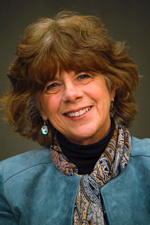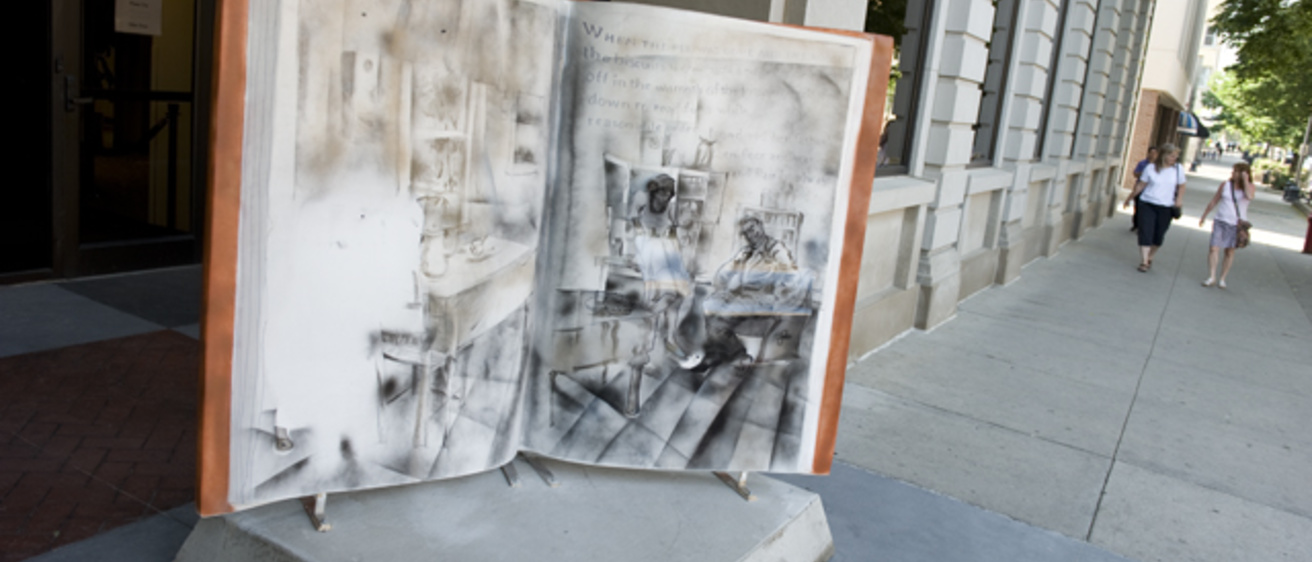Here in Iowa City, the words we cultivate are as famous and prolific as the corn we grow. The Writing Universityis a term we almost take for granted.

When we rush down Iowa Avenue to a meeting, we don’t always notice our feet as they touch the brass plaques of writers’ words. We see the ever-shifting book jacket décor on the walls at Linn St Café and Prairie Lights, all authored by University of Iowa writers. We’re often too busy to go to all of the readings we’d like to attend over a given week, or to take in the regular demonstrations and exhibits in our libraries and from our Center for the Book.
At Book Festival time in July, we might remember that Iowa City is a UNESCO City of Literature, the only such city in the United States. We see just about as many book sculptures around town as there are Herky sculptures. Like our relationship with the local crops that feed the world, we’re conscious and aware of this town’s writing heritage, but most of the time, it’s a fuzzy backdrop for our daily lives.
Even though I am a professor of both English and education, I forget how proud I am to be here until I show a visitor around town. When my historian friend Dan, a school superintendent, visited from Cambridge, Mass., he remarked, “Whoa, it’s like Harvard Square without the attitude!” My moviemaking, Oscar-winning brother from Hollywood couldn’t get over how many people he’d met in “the word business.”
“In two days, I had two cab drivers who were writers, the guy who sold me a bottle of wine had a Ph.D., and everyone I met was talking about a book. Not like that where I live.”
In the College of Education, we’re widely known for our role in the history of tests and measurements, but lesser known is our distinguished legacy related to writing. After more than 40 years of teaching English in two departments, both here and at the University of New Hampshire, I’ve recently had time to reflect on the great benefits both institutions reap from the fluidity between the English and Education departments. It’s easy to forget that such a symbiotic relationship is not universal in academe. I’ve often joked about a campus I know in which there is a large old cannon on a vast green lawn, aimed straight from its school of education to its liberal arts building. The message is different here.
Ours is a legacy that began several teaching generations ago, with Professor John Gerber, longtime English department chair and first president of the National Council of Teachers of English. Here at the UI in the 1970s, fiction and poetry writing were already comfortably established disciplines. Professors Carl Klaus, Richard Braddock, Lowell Schoer, Richard (“Jix”) Lloyd-Jones, and others were defining writing-across-the curriculum and awarded a large grant to house college writing teachers from across the country for a year of professional development. These educational pioneers are always cited in histories of the development of teaching writing.
Since then, Iowa has enjoyed four more decades worth of other projects linking writing through English and education. I have been lucky to be a part of this collaborative work through the 1990s and into this century, with colleagues James Marshall, Anne DiPardo, who were jointly appointed as I am, Brooks Landon and Paul Diehl in English, Carol Severino and Mary Trachsel in Rhetoric, Kathy Whitmore and Carolyn Colvin in Education, and so many others. Our Ph.D. students in the Language, Literacy, and Culture program, as well as our master’s and MAT students in English education, and our MFAs in nonfiction and other writing-related disciplines, have gone on to teach writing—and the teaching of writing—across the country and around the world. My guess is that many of them would long for one more stroll down Iowa Avenue, this time to read the writers’ words on the sidewalk, an extra half-hour at Linn Street Café or Prairie Lights, or a few minutes in front of one of those giant book statues.
One thing I know for sure, though, is that they’d all be able to write about it!
A professor of English and education, Bonnie S. Sunstein is director of the undergraduate nonfiction writing program.
